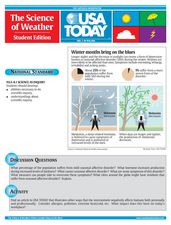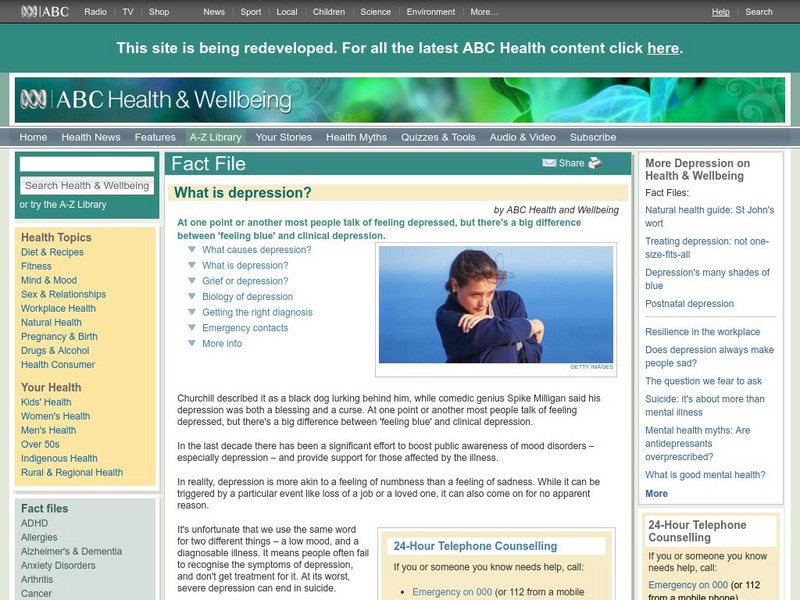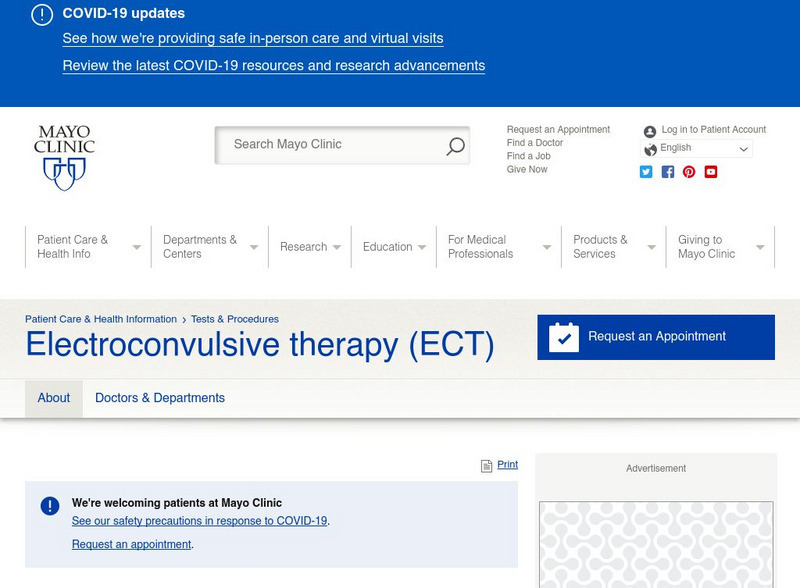Curated OER
Mental Illness: Could It Happen to Me?
Students investigate the effects of depression and the brain's influence on metal illness. The factors that may affect a person's ability to develop depression are examined in this lesson.
Curated OER
Mental Health Scenarios
High schoolers define various mental disorders and list some of their signs and symptoms. They identify mental disorders after being given hypothetical scenarios. They share their results with the class.
Curated OER
What's Wrong?
Students analyze case studies to explore similarities and differences among illnesses. PET images are examined to explore how scientists investigate the changes in the way the brain functions during depression.
Curated OER
Treatment Works!
Students consider the goals of a treatment plan for persons who have had the way they think, feel, or behave changed because of mental illness. PET images are utilized to support the evidence of changes in the activity and functioning of...
Curated OER
The Science of Weather
Students read an article. In this seasons lesson, students discuss the seasons and seasonal affective disorder. Students find an article that illustrates other ways that the environment negatively effects humans.
Mental Health America
Mental Health America: Mental Health Info: Depression
Comprehensive mental health information on a variety of topics dealing with depression, with a link to a self-assessment screener for assessing symptoms of depression.
PBS
Pbs Teachers:what Is Depression?
Examine teenage depression: what it's all about, how it feels and ways to deal with it.
Other
International Foundation for Research and Education on Depression
A good overview of depression, plus resources.
Khan Academy
Khan Academy: Psychoactive Drugs: Depressants and Opiates
An explanation of the effects the psychoactive drugs, depressants and opiates, have on the body.
Khan Academy
Khan Academy: Diagnosing Depression
An overview of how clinicians diagnose depression by using the dsm-5, a Diagnostic and Statistical Manual of Mental Disorders.
Khan Academy
Khan Academy: Introduction to Psychology Depression and Major Depressive Disorder
Factors involved in depression including biological, psychological, socio-cultural or environmental as well as genetic components (5-htt LPR) are examined.
Khan Academy
Khan Academy: Biological Basis of Depression
Major depressive disorder is a major cause of distress disability and death from suicide. This video examines the brain and its connection to depression.
Khan Academy
Khan Academy: What Is Depression?
An overview of depression including symptoms, causes, treatment, and brain functions.
Khan Academy
Khan Academy: Types of Depression and Bipolar Disorder in the Dsm5
A description of the various types of depression and bipolar disorder including bipolar1 and bipolar2 that occur in adults and children.
Khan Academy
Khan Academy: Treatment for Depression Psychological Therapies
An overview of psychological therapies for depression are examined: psychological, behavioral, psychodynamic, interpersonal, cognitive, and cognitive-behavioral.
Khan Academy
Khan Academy: Treating Depression With Antidepressants
A discussion of the three classes of antidepressants: MAOI's, TCA's, and SSRI's used to treat depression.
Australian Broadcasting Corporation
Australian Broadcasting Corporation: Dark Side of the Mood: Dealing With Depression
This guide describes the causes of depression, its symptoms, and potential treatments (including "alternative" choices). It also debunks depression myths. Site provided by the Australian Broadcasting Corporation.
Khan Academy
Khan Academy: Introduction to Psychology Depression and Bipolar Disorder
An explanation of bipolar1 and bipolar2 disorders and their relationship to mania.
Khan Academy
Khan Academy: Overview of Psychoactive Drugs
An overview of psychoactive drugs: depressants, stimulants, hallucinogens, and opiates.
Khan Academy
Khan Academy: Psychosis
An overview of psychosis including types of delusions: delusions of reference, grandiose delusions, paranoid delusions, delusions of control, and erotomaniac. Also discussed are hallucinations, disorganized behavior, disorganized...
Khan Academy
Khan Academy: Diagnosing Bipolar Disorder
In order to qualify for a bipolar disorder one must have at least three of the symptoms explored in this video.
Khan Academy
Khan Academy: Risk Factors for Bipolar Disorder
Examined are factors that increase the risks of bipolar disorder: psychological, environmental, genetic, neuro chemical, and difference in brain structure and function.
Khan Academy
Khan Academy: Treatments for Bipolar Disorder
Medication and psychological interventions are discussed for treating bipolar disorder.
Mayo Clinic
Mayo Clinic: Electroconvulsive Therapy
This resource provides information about electroconvulsive therapy.























